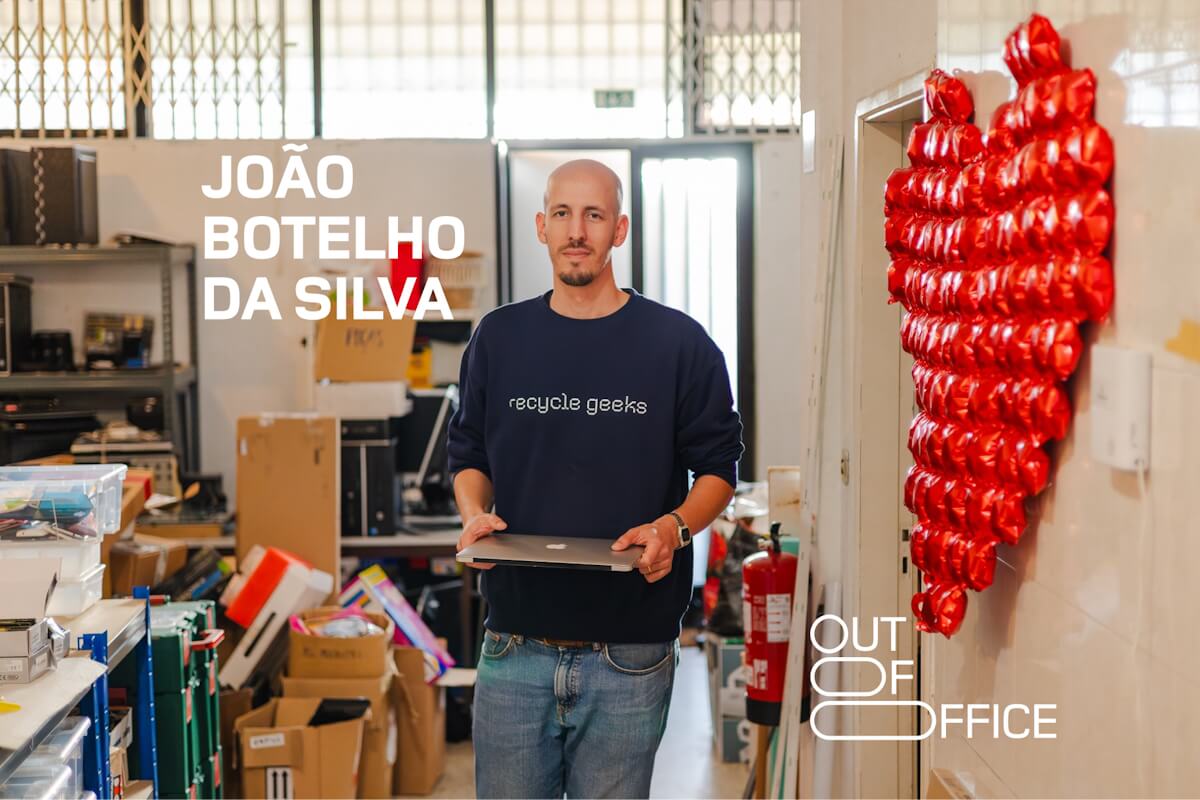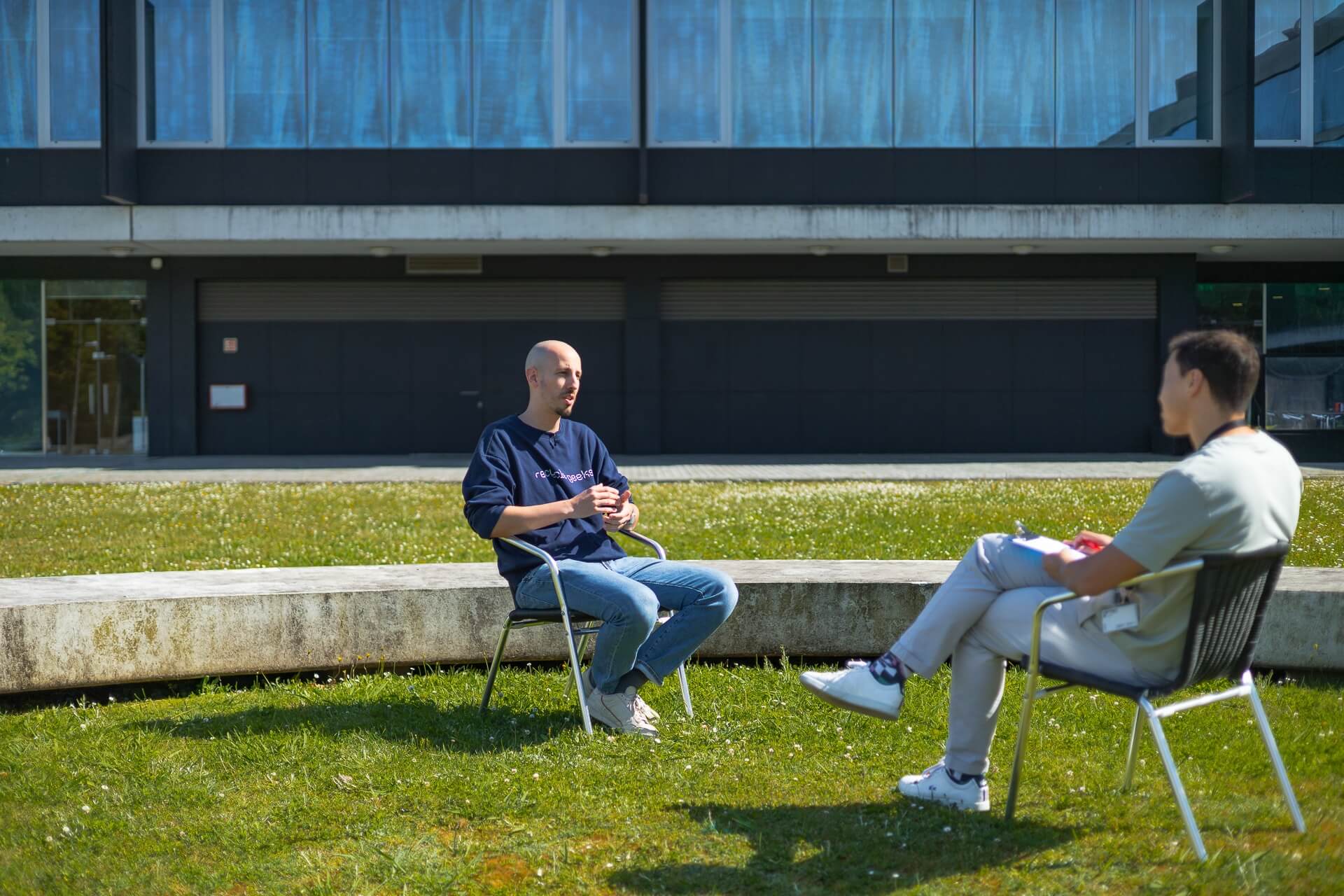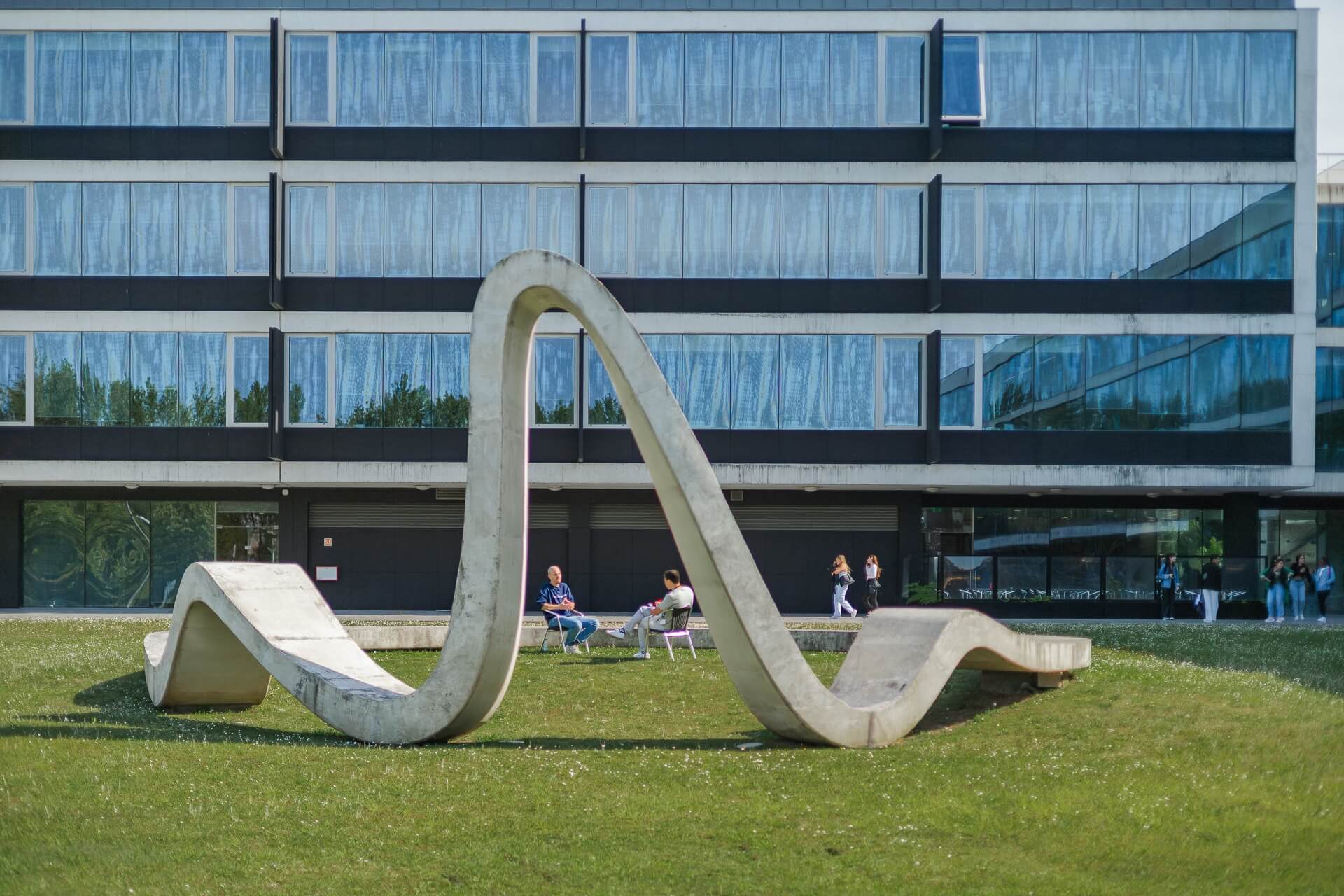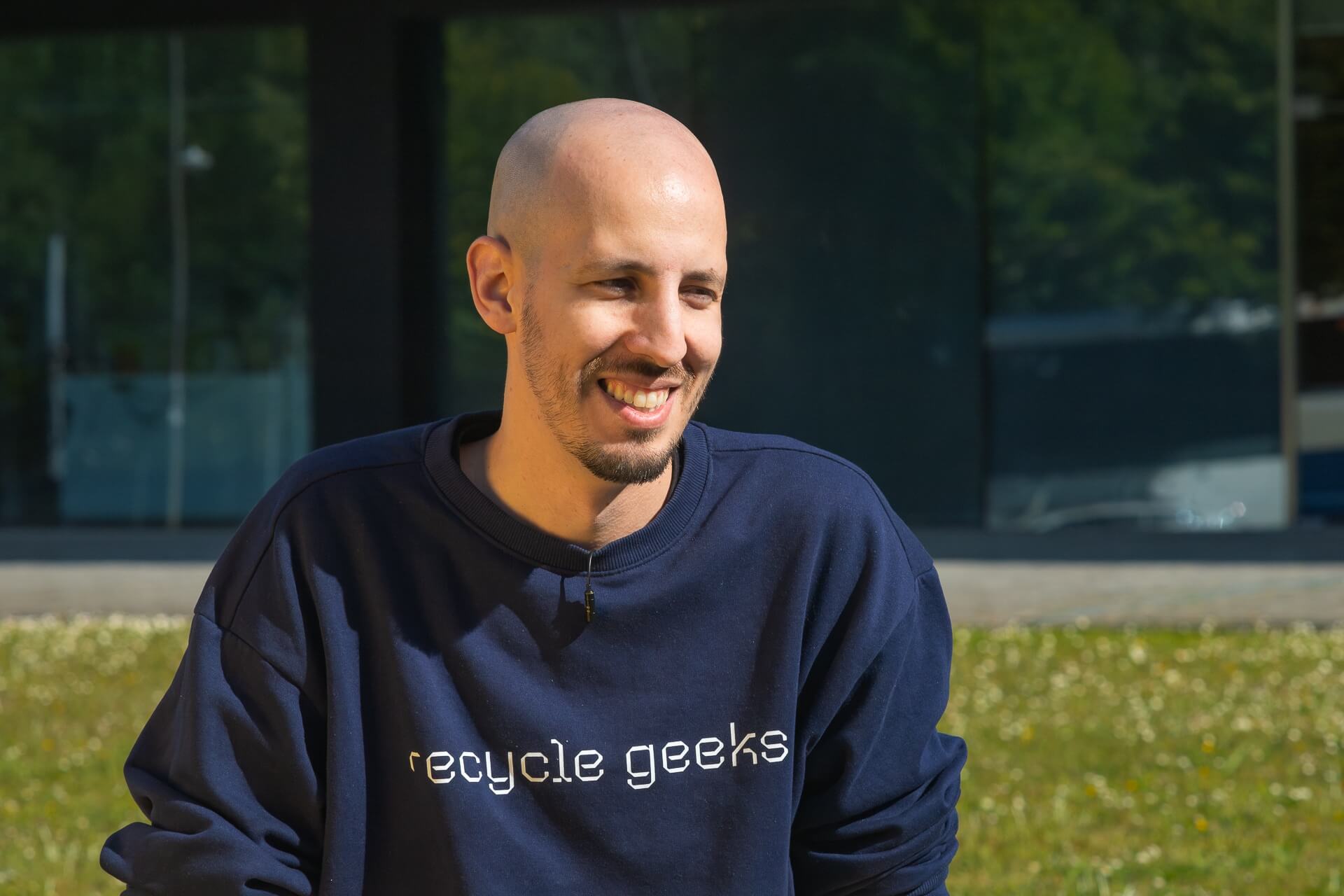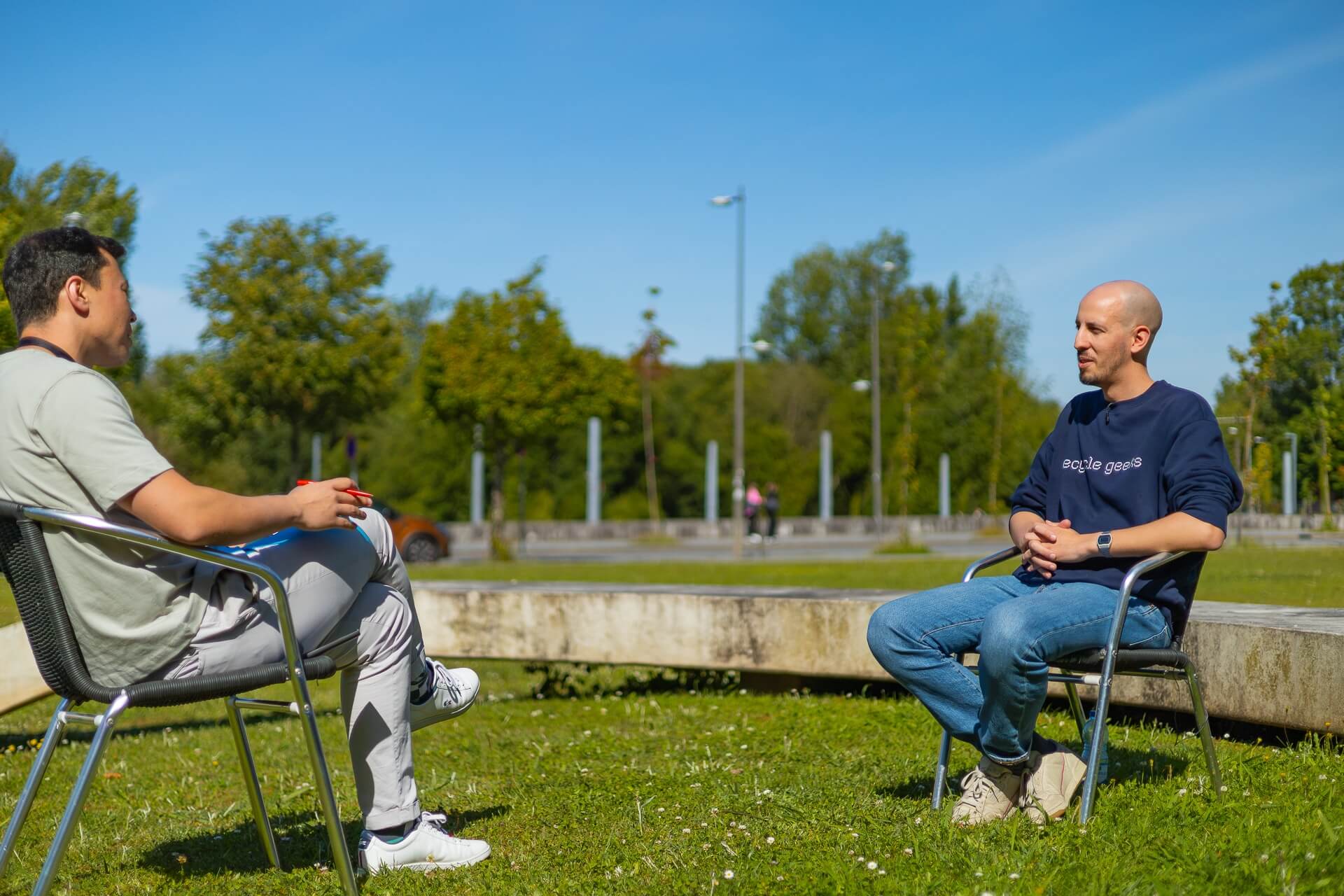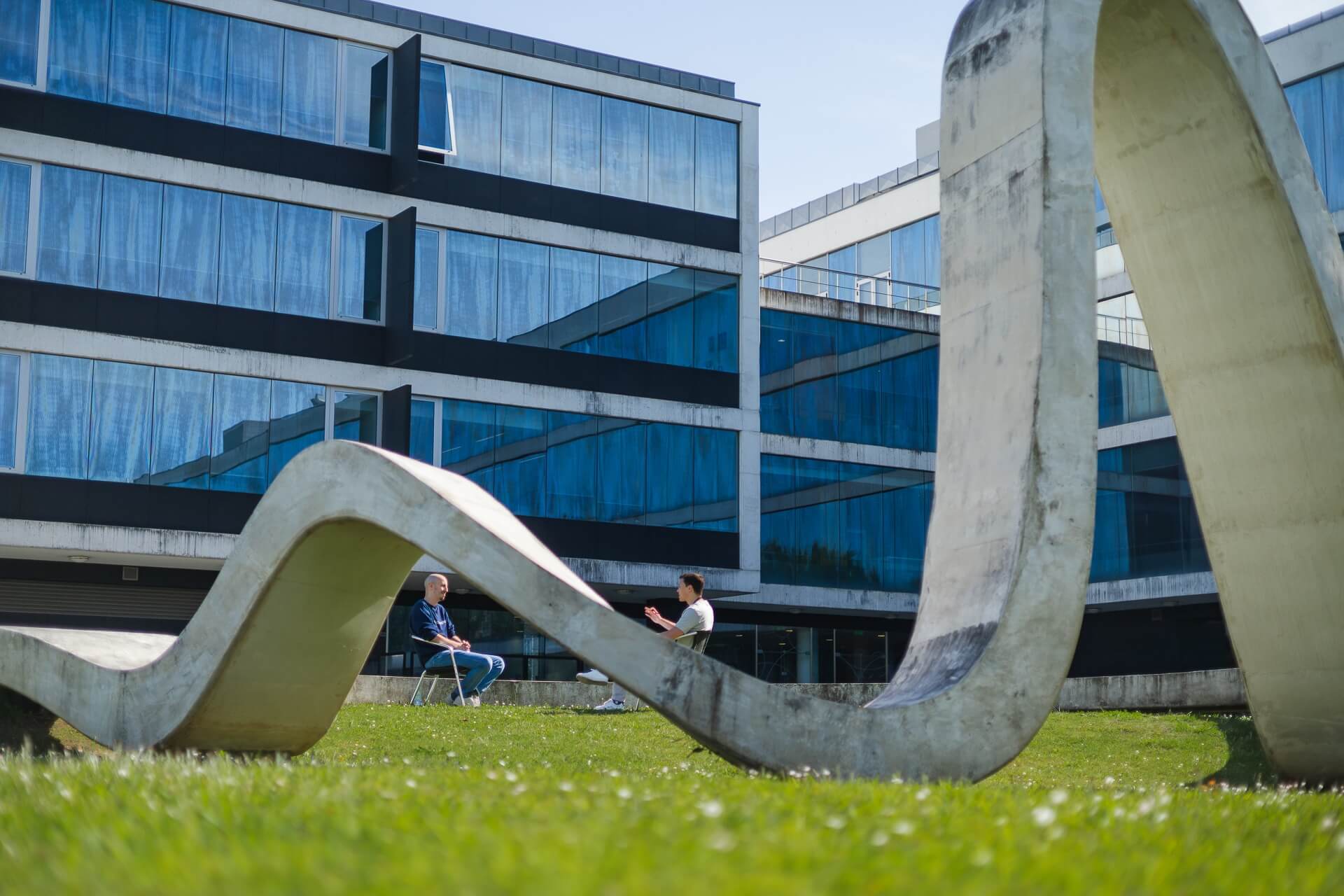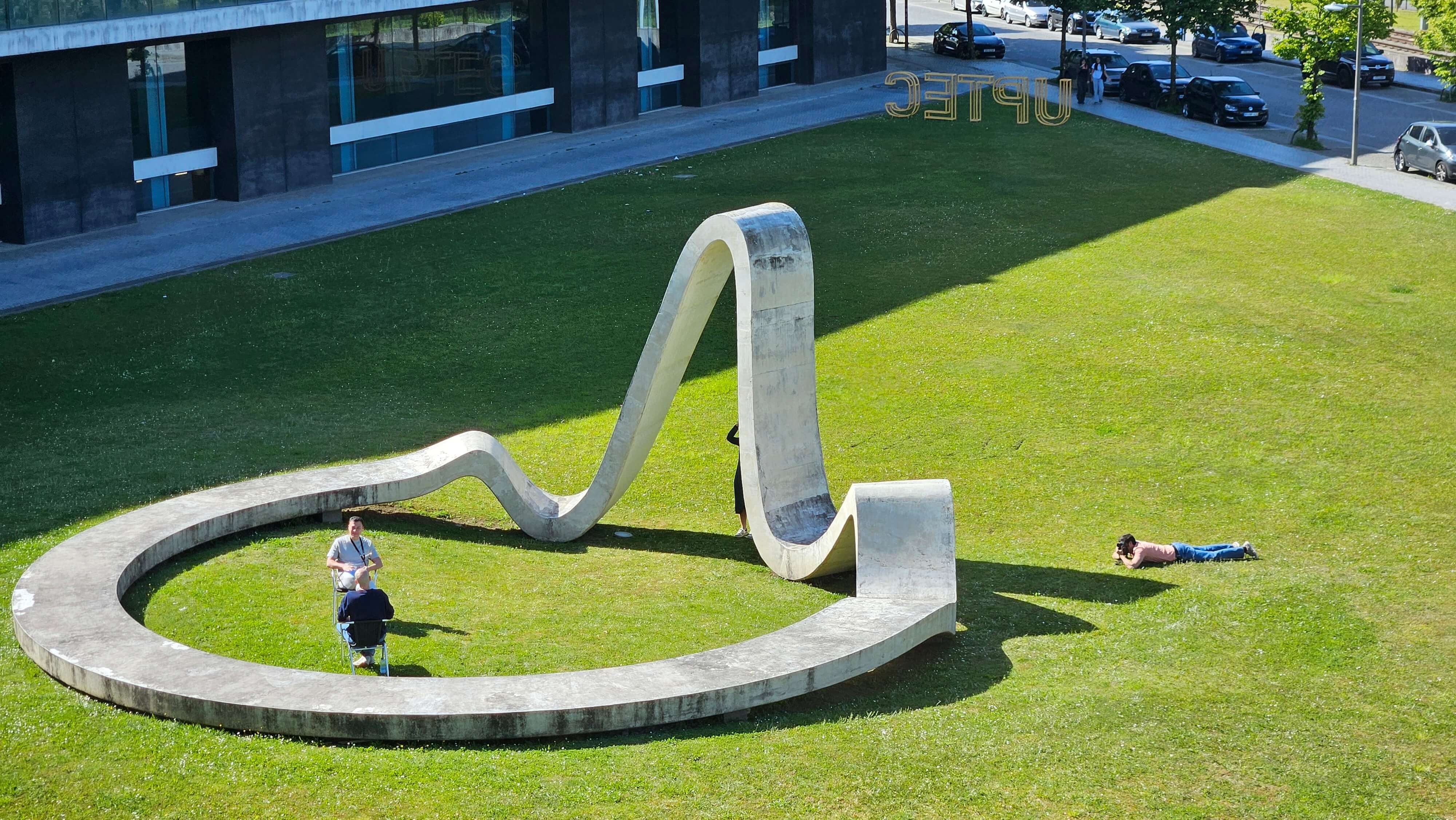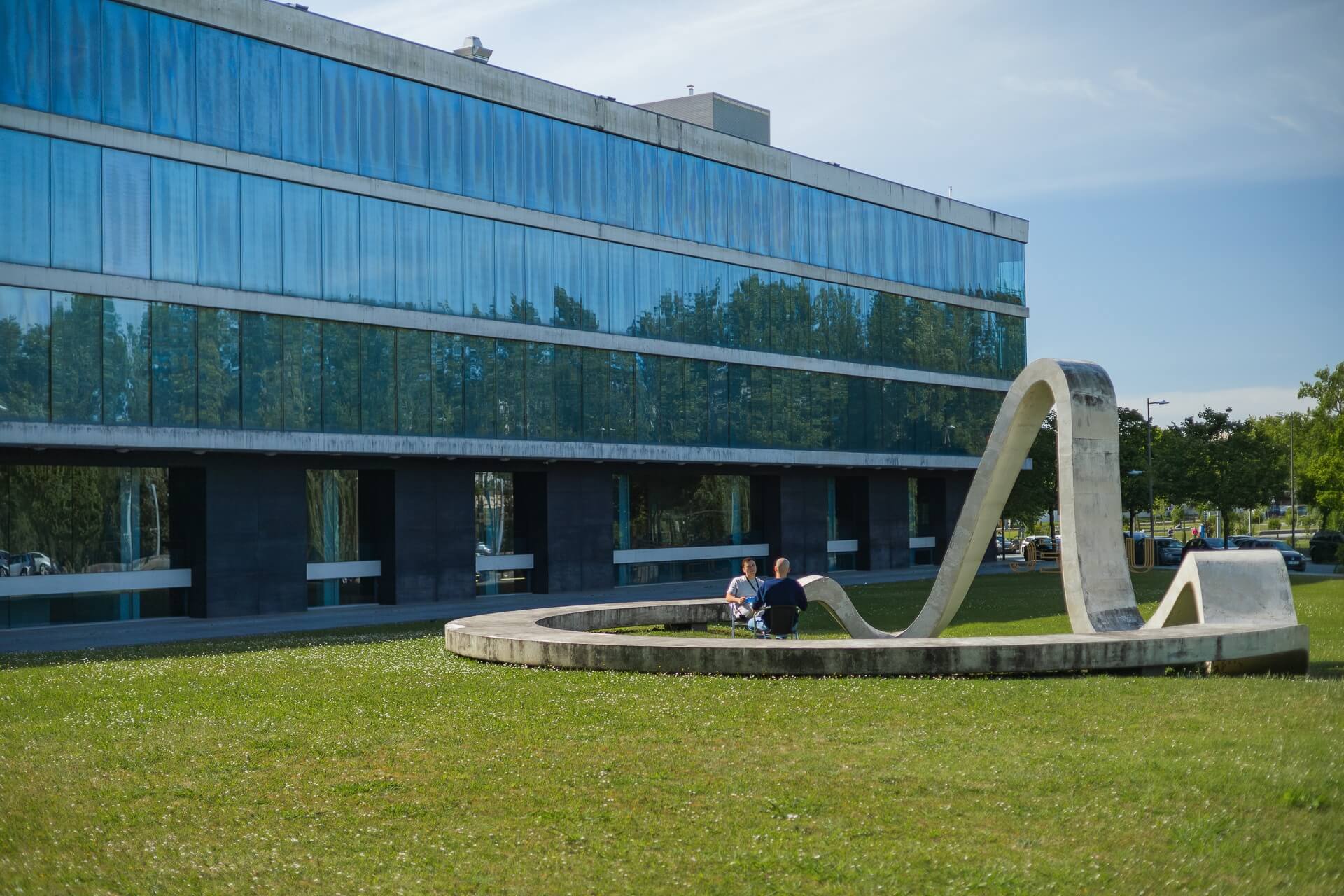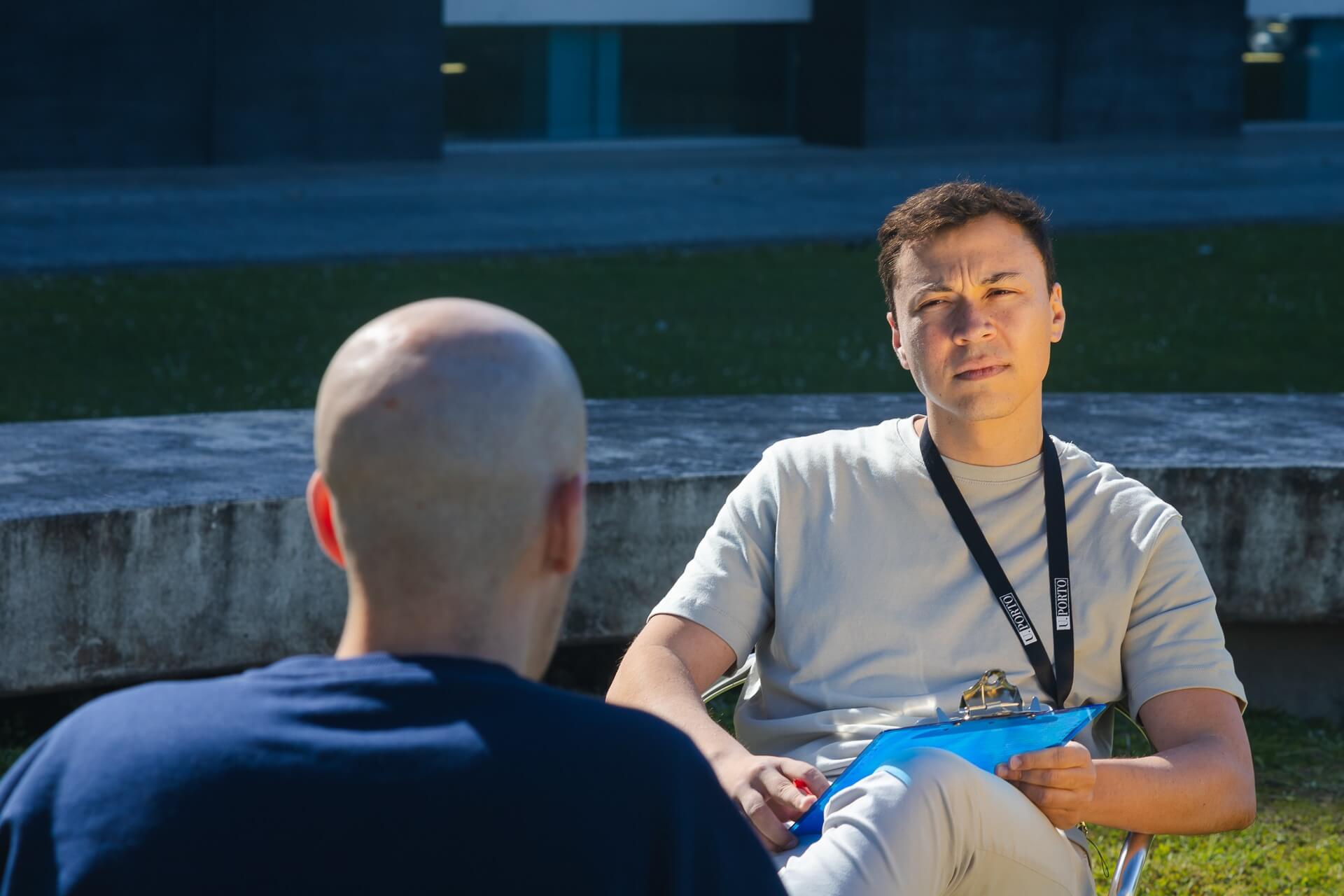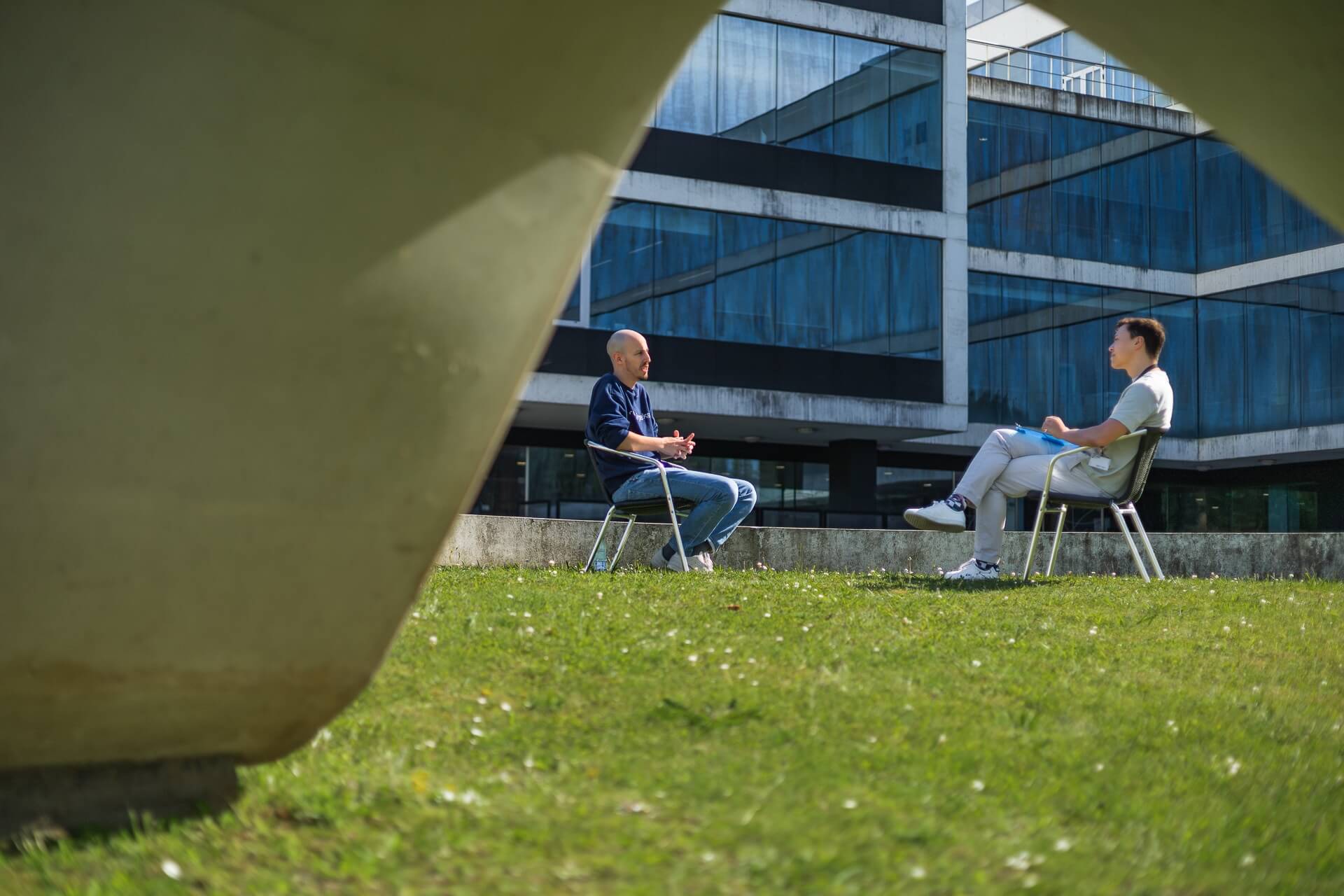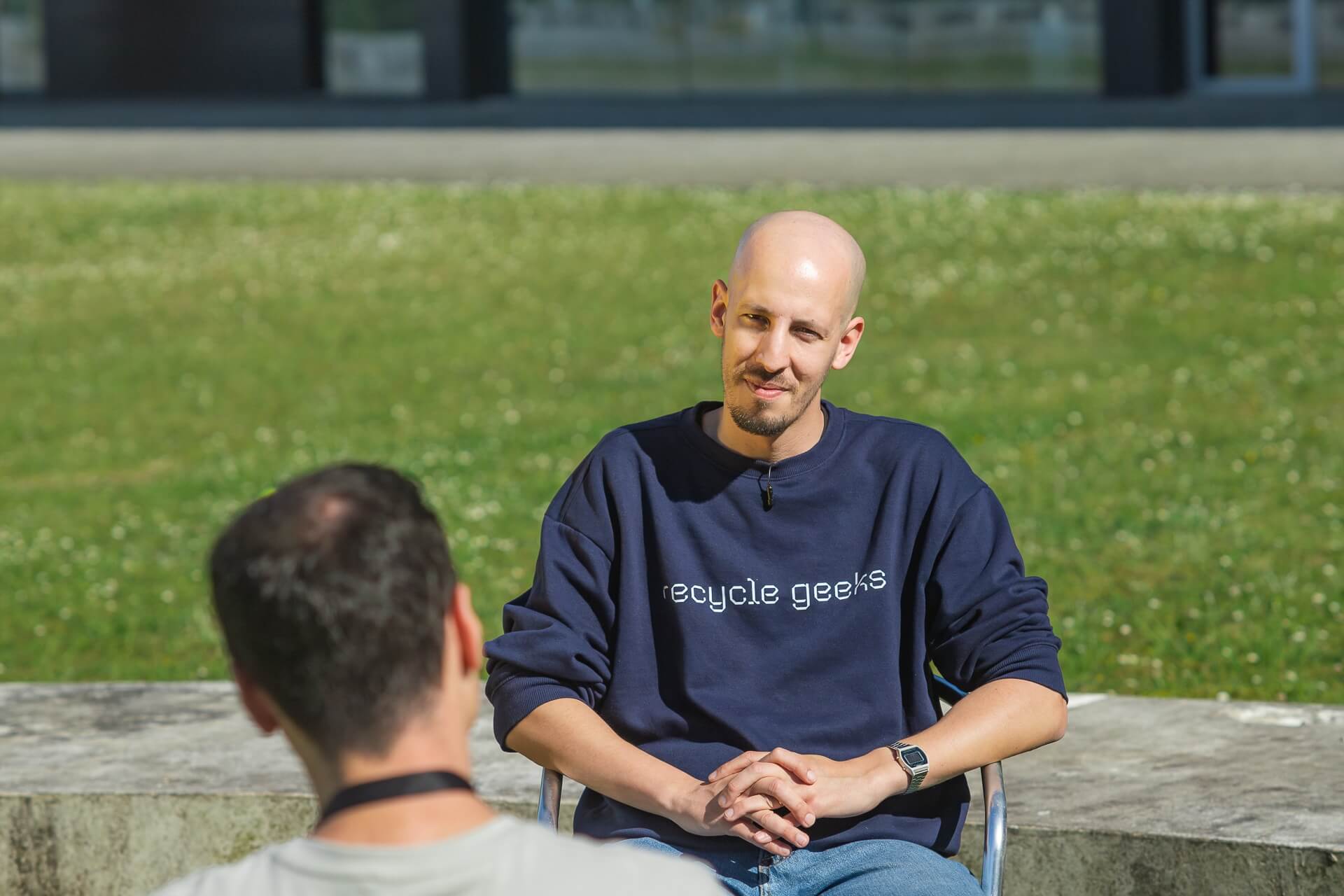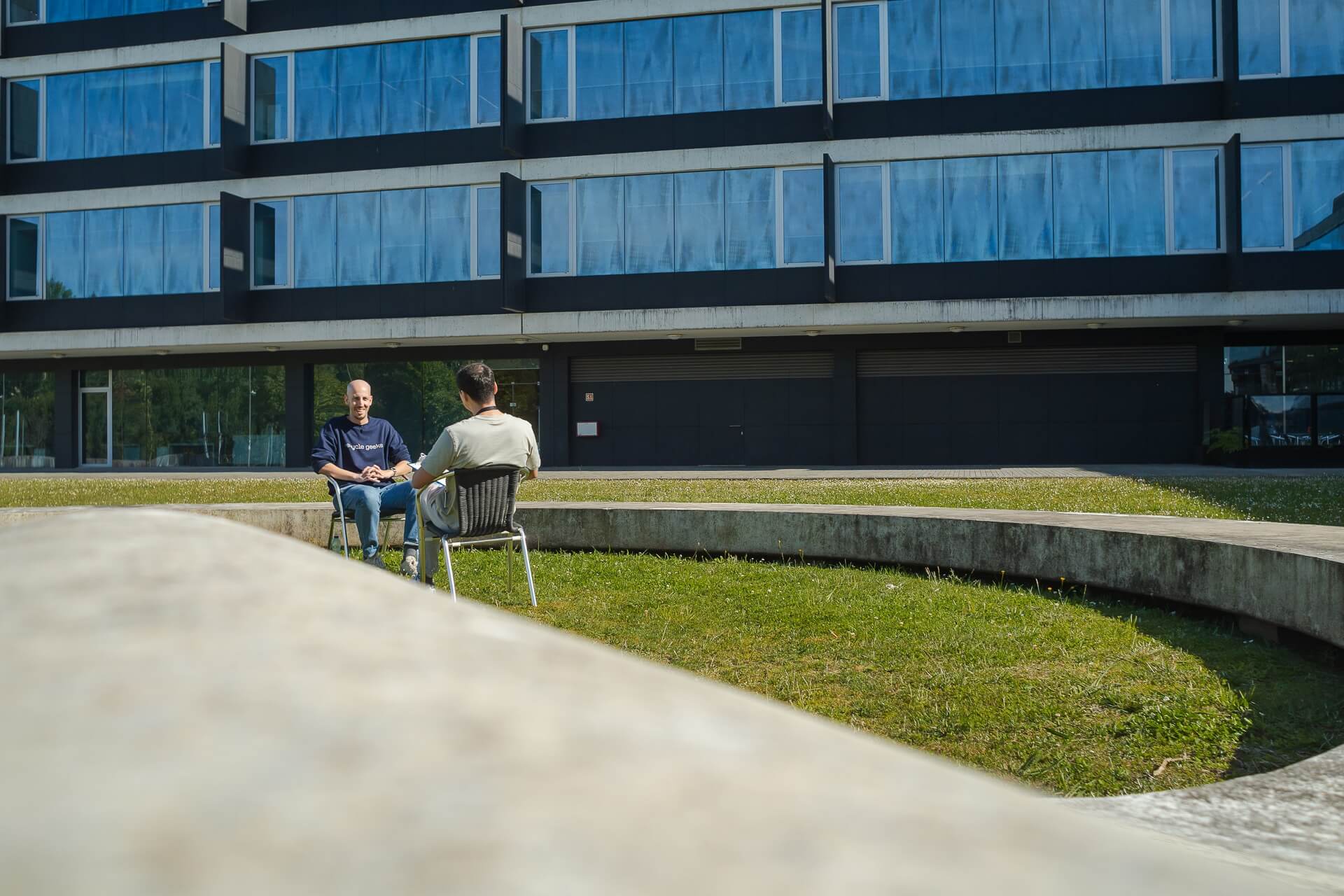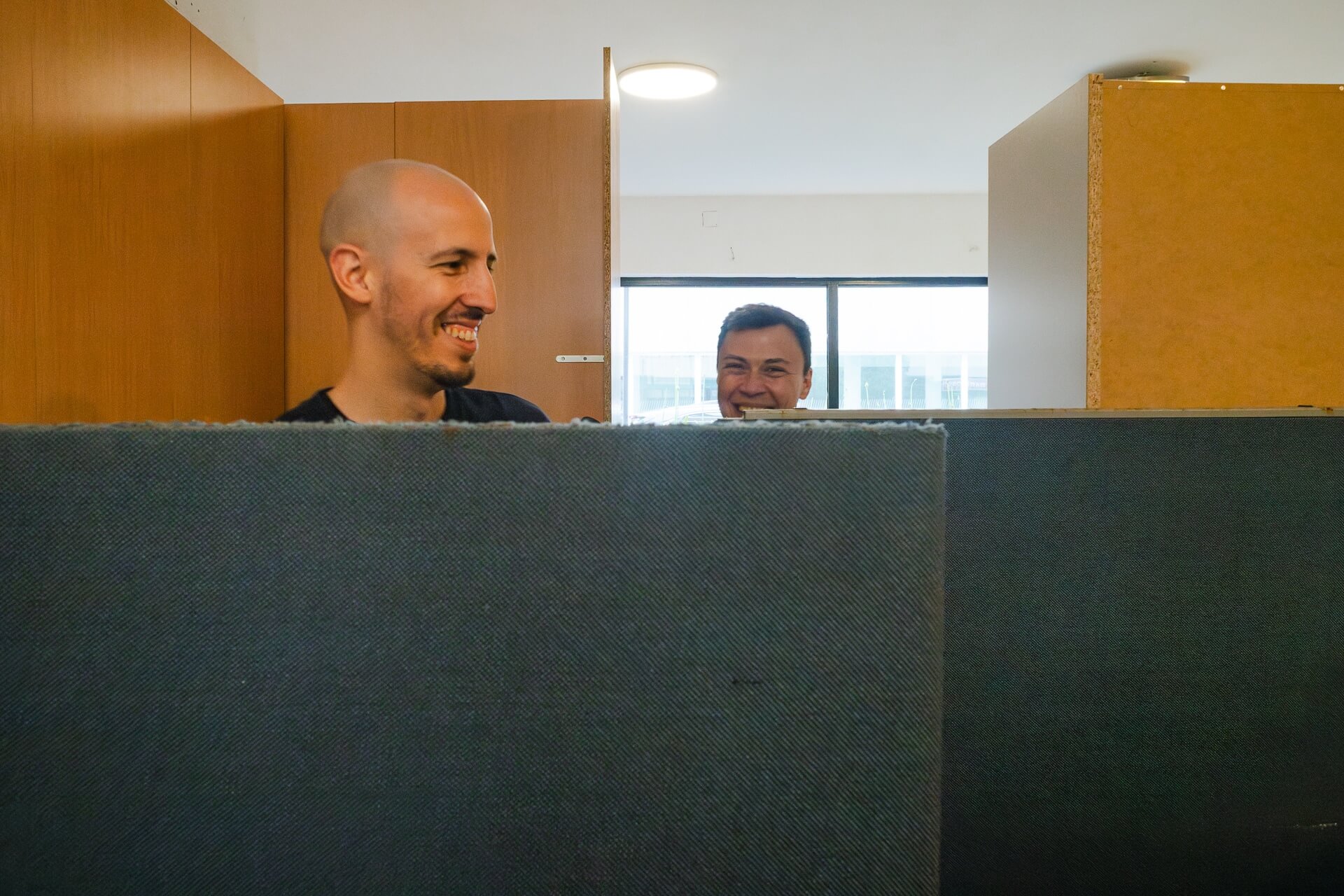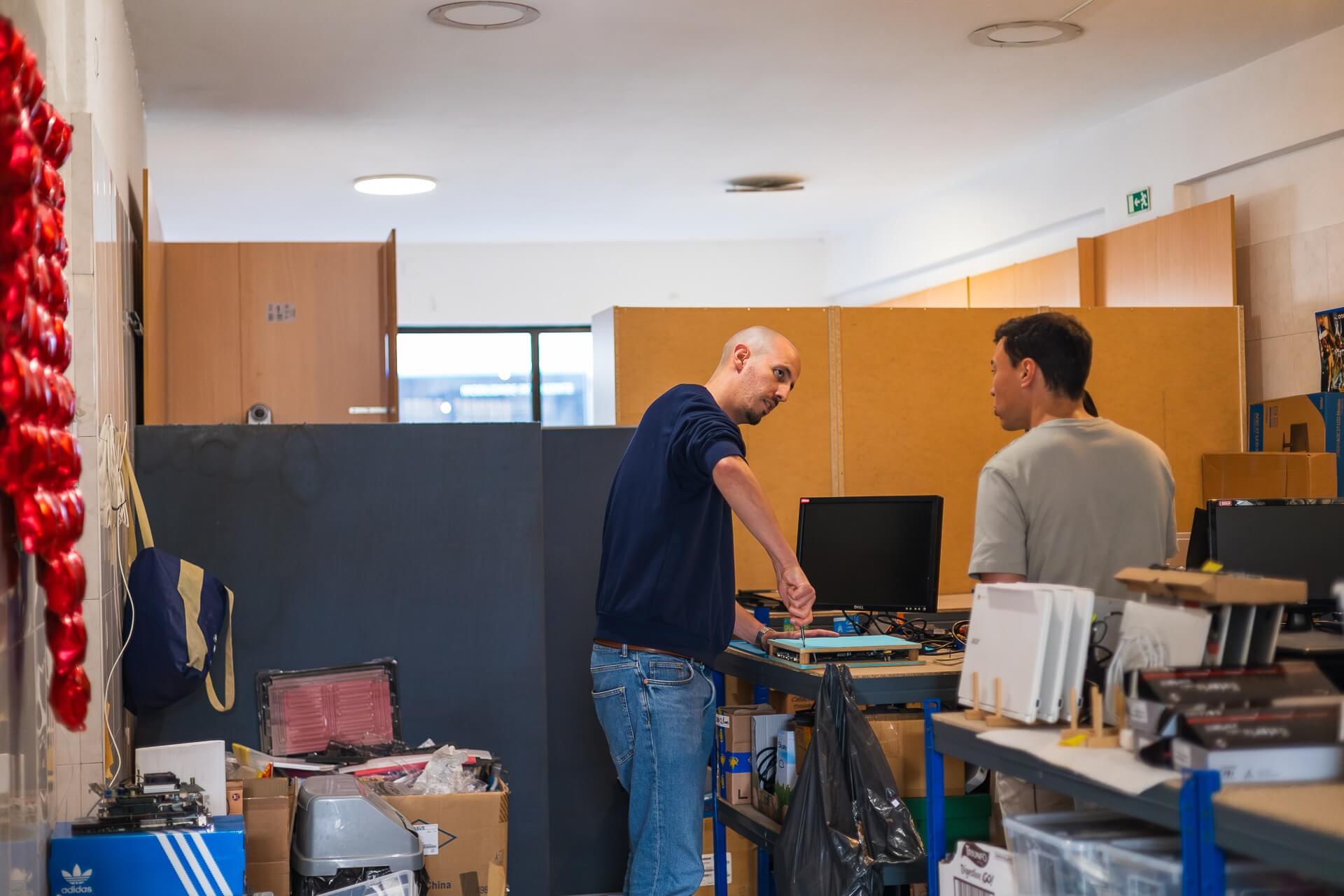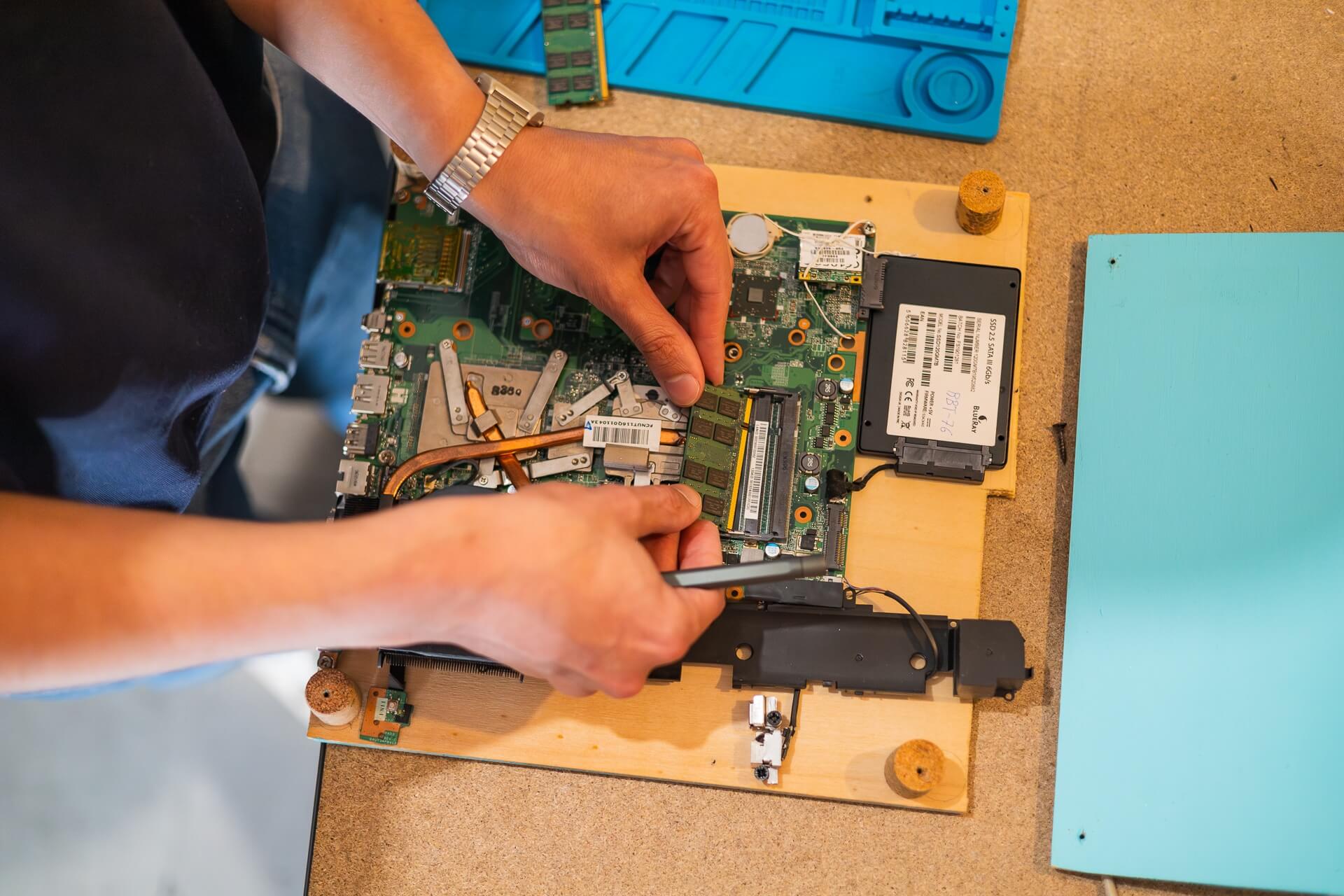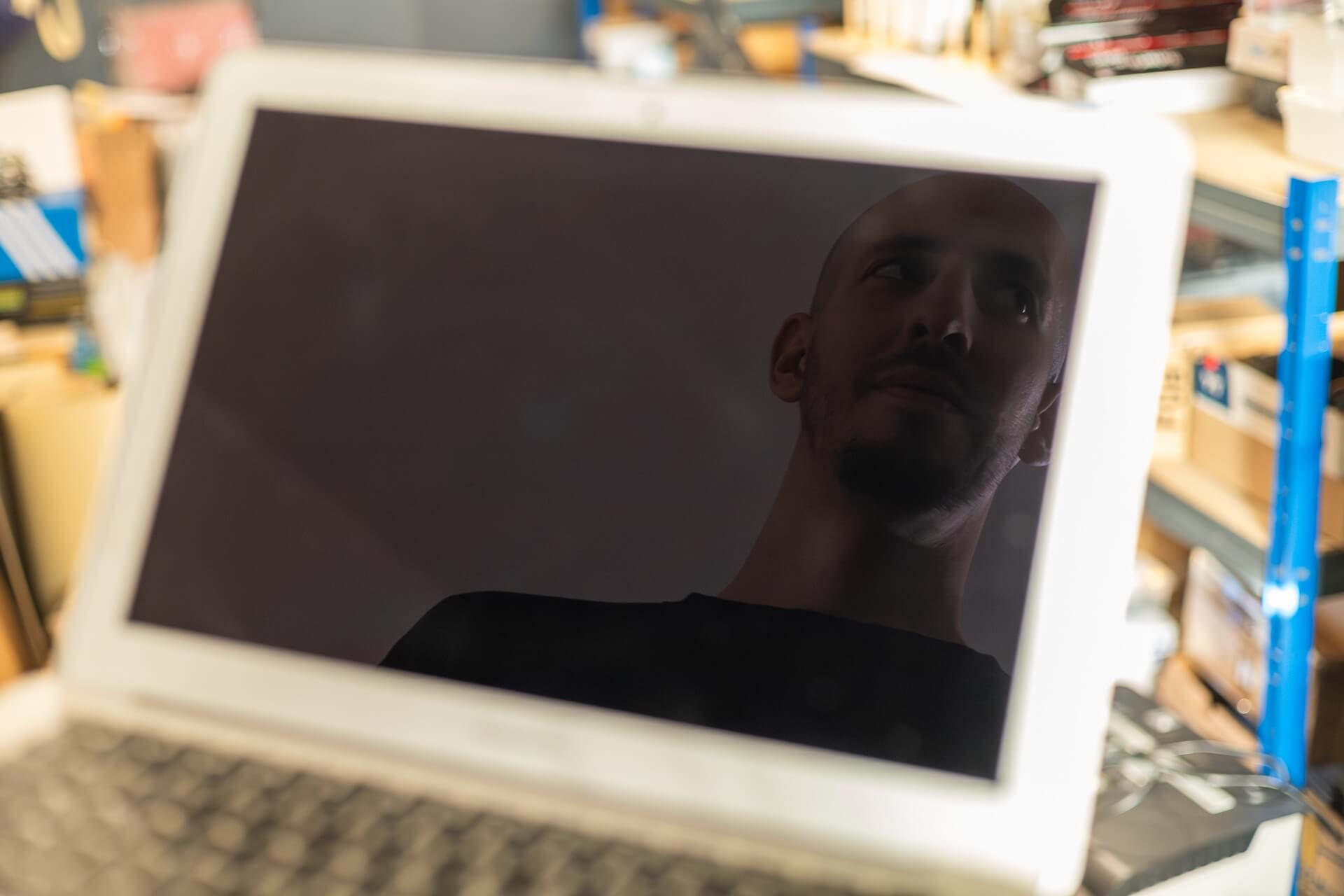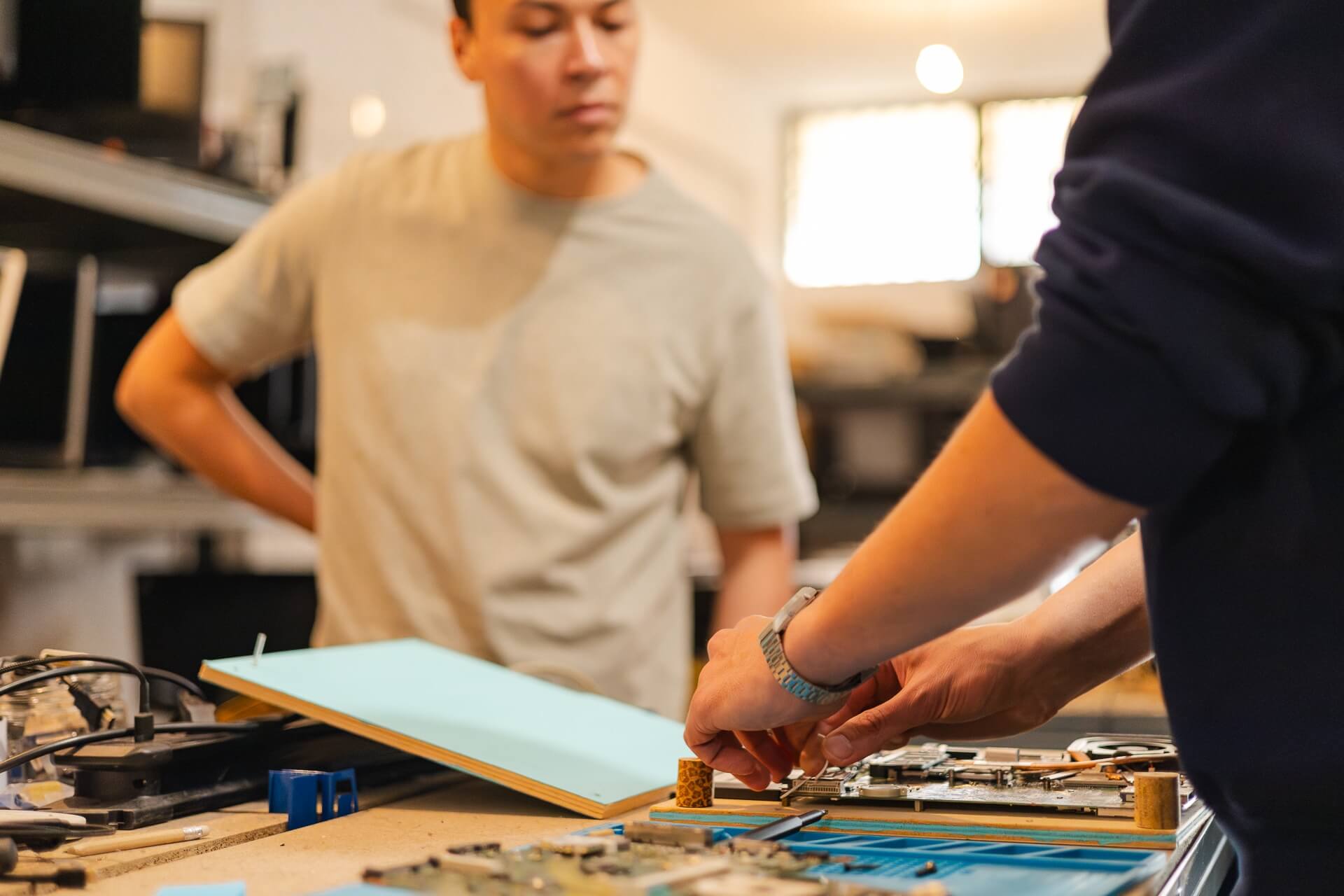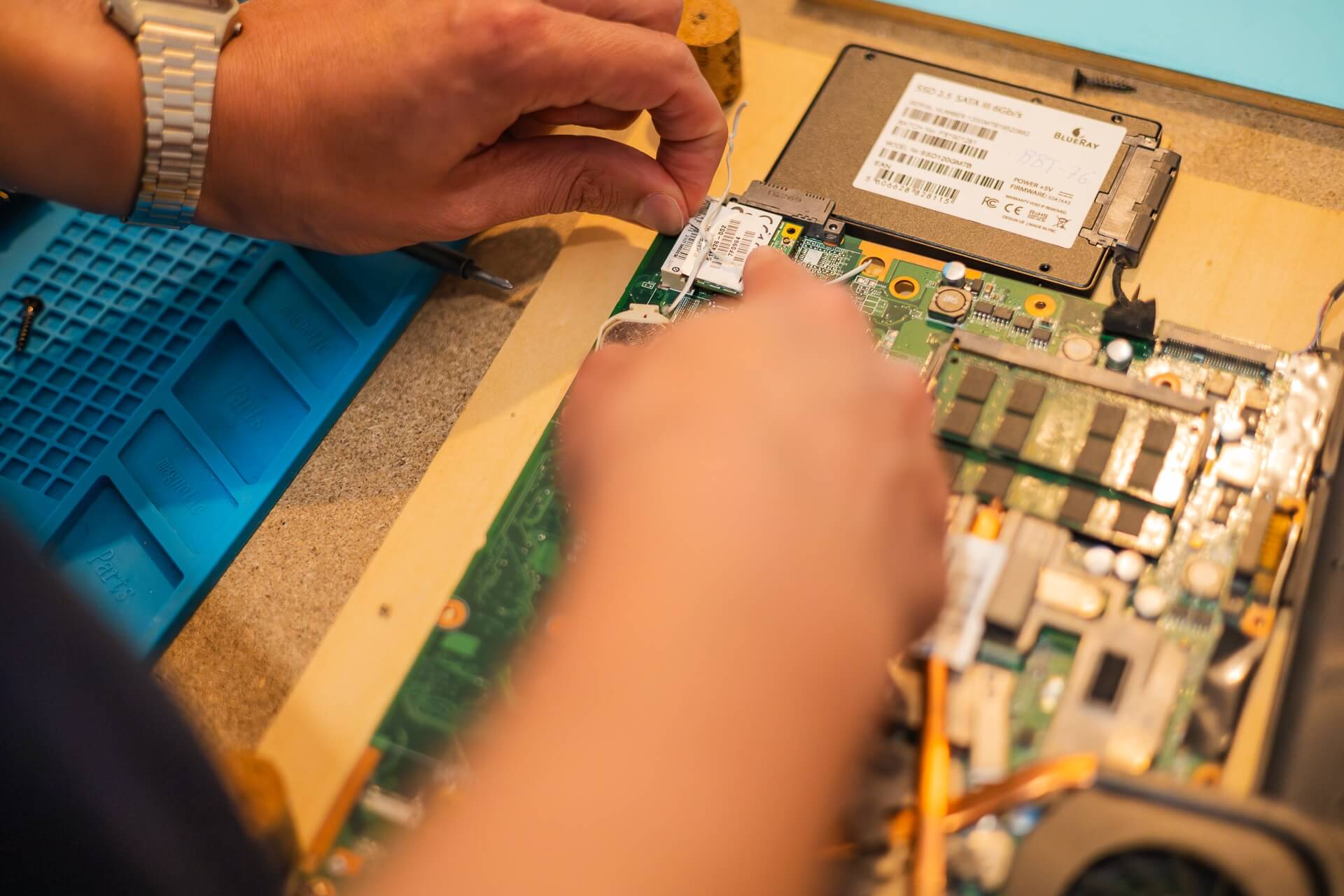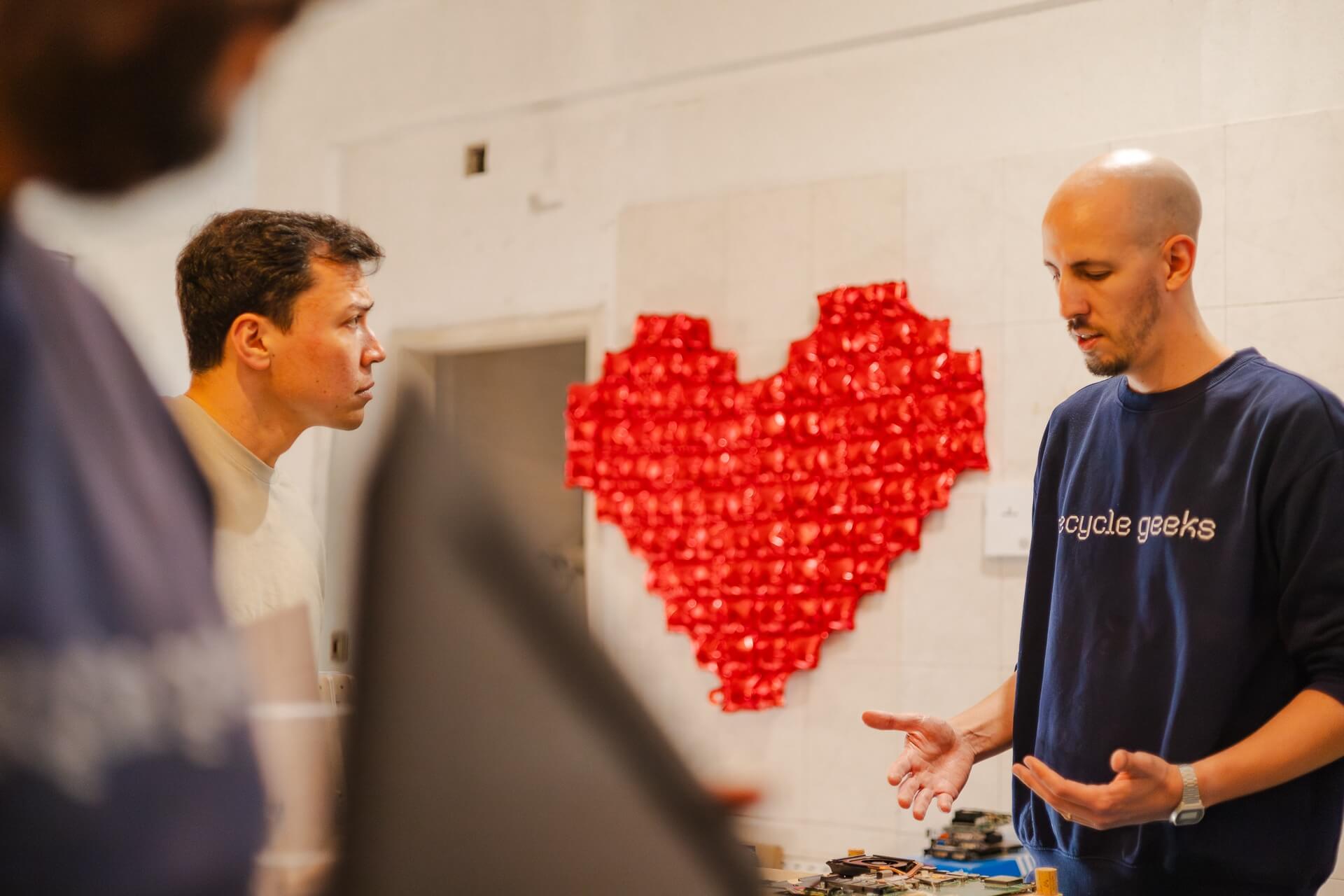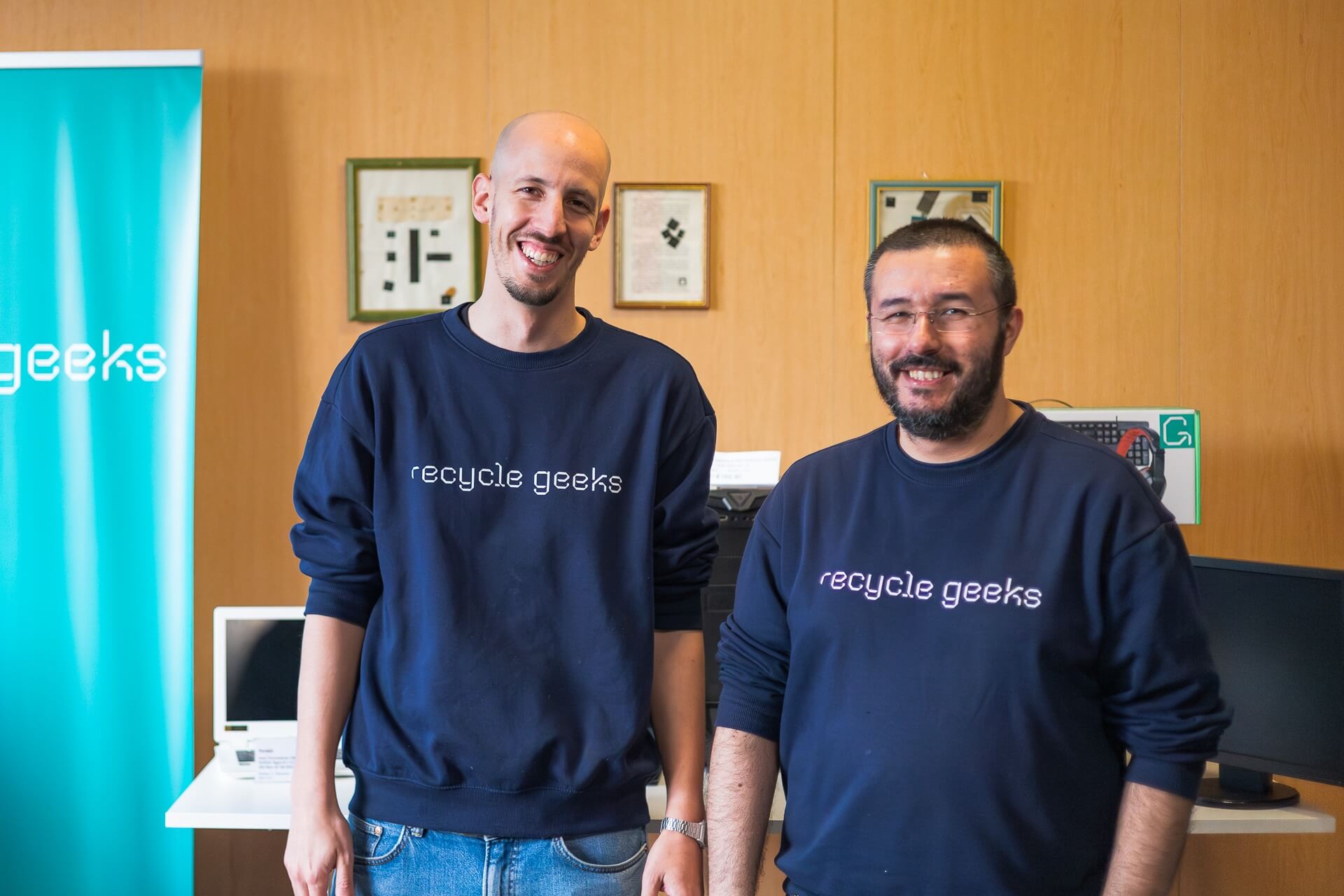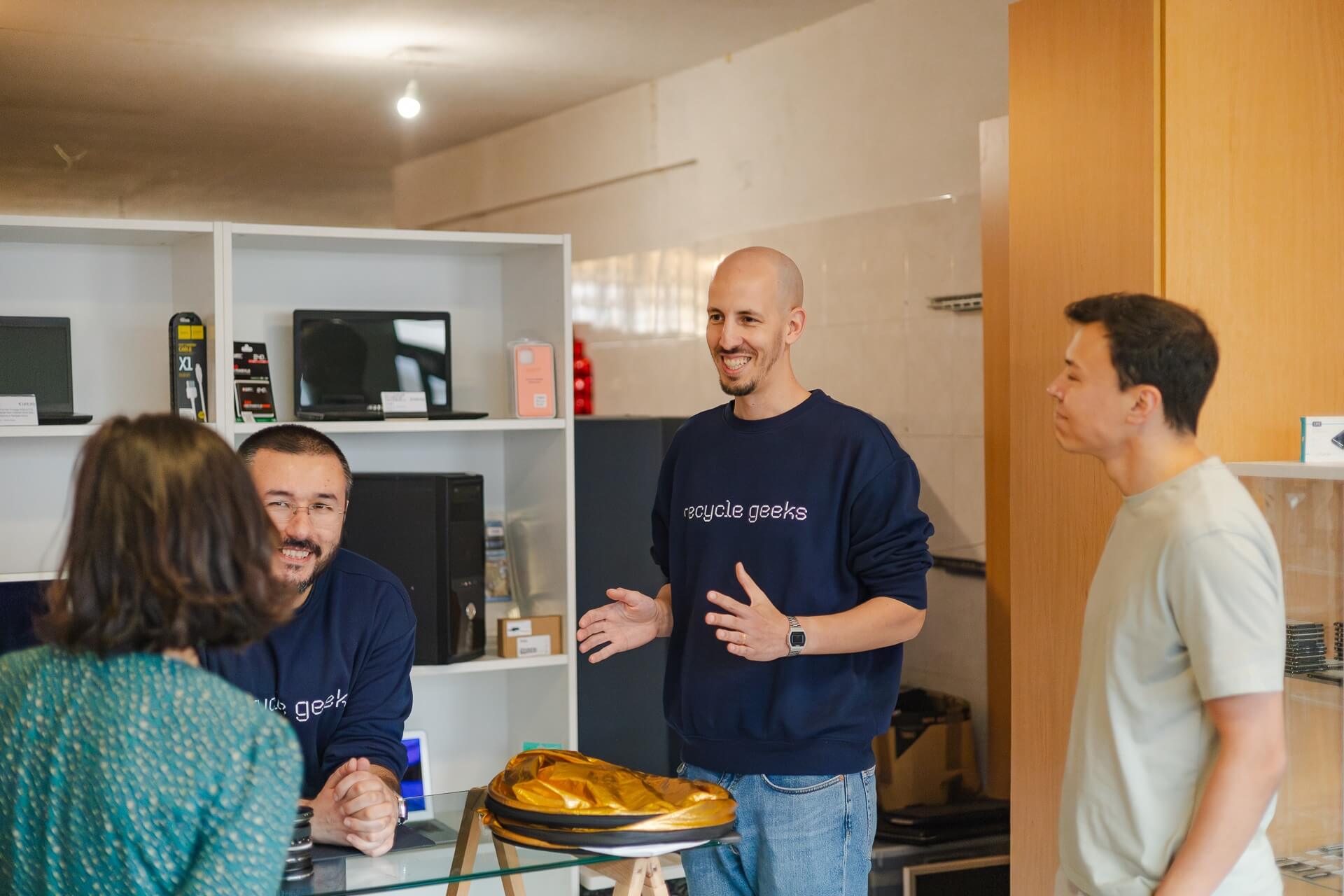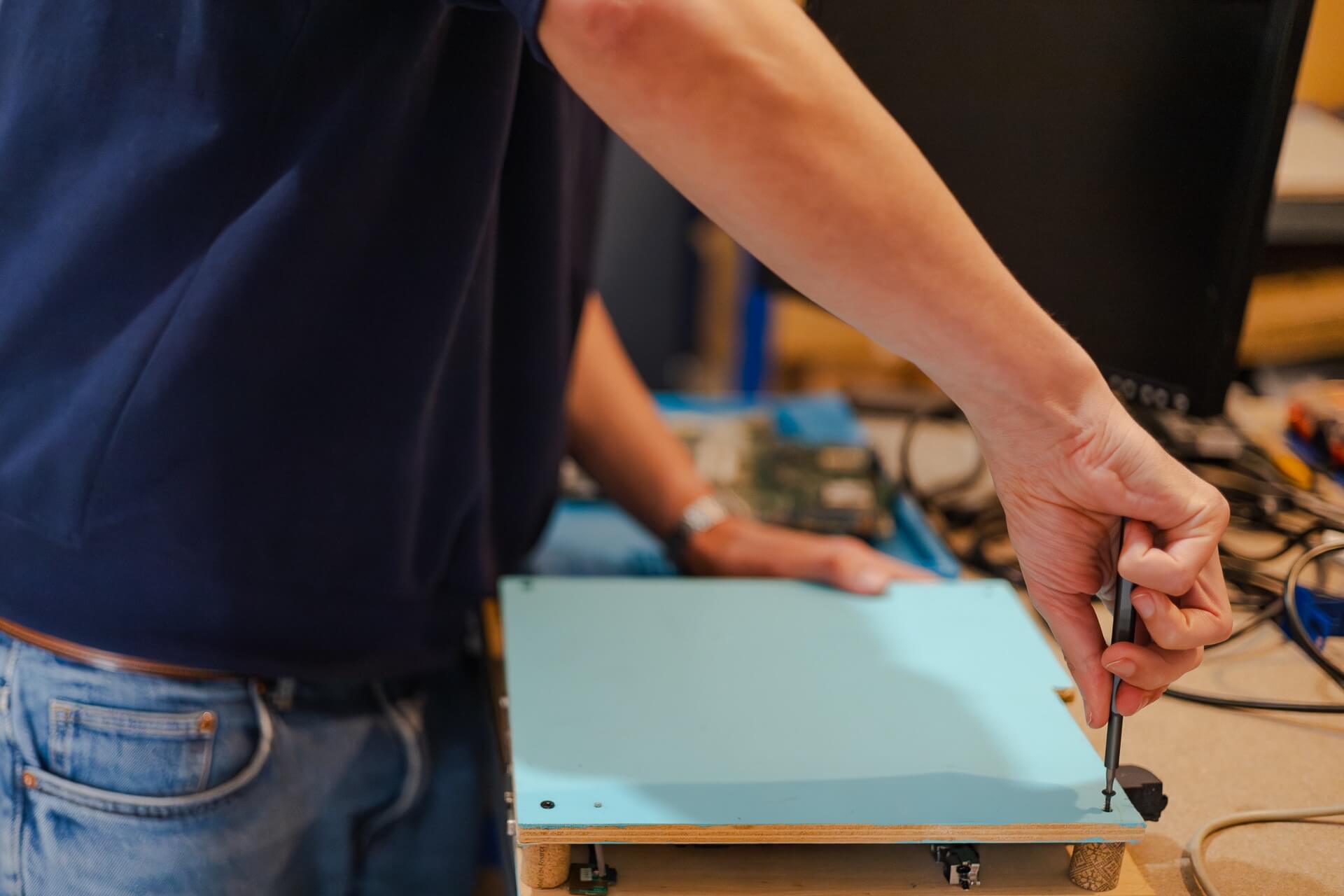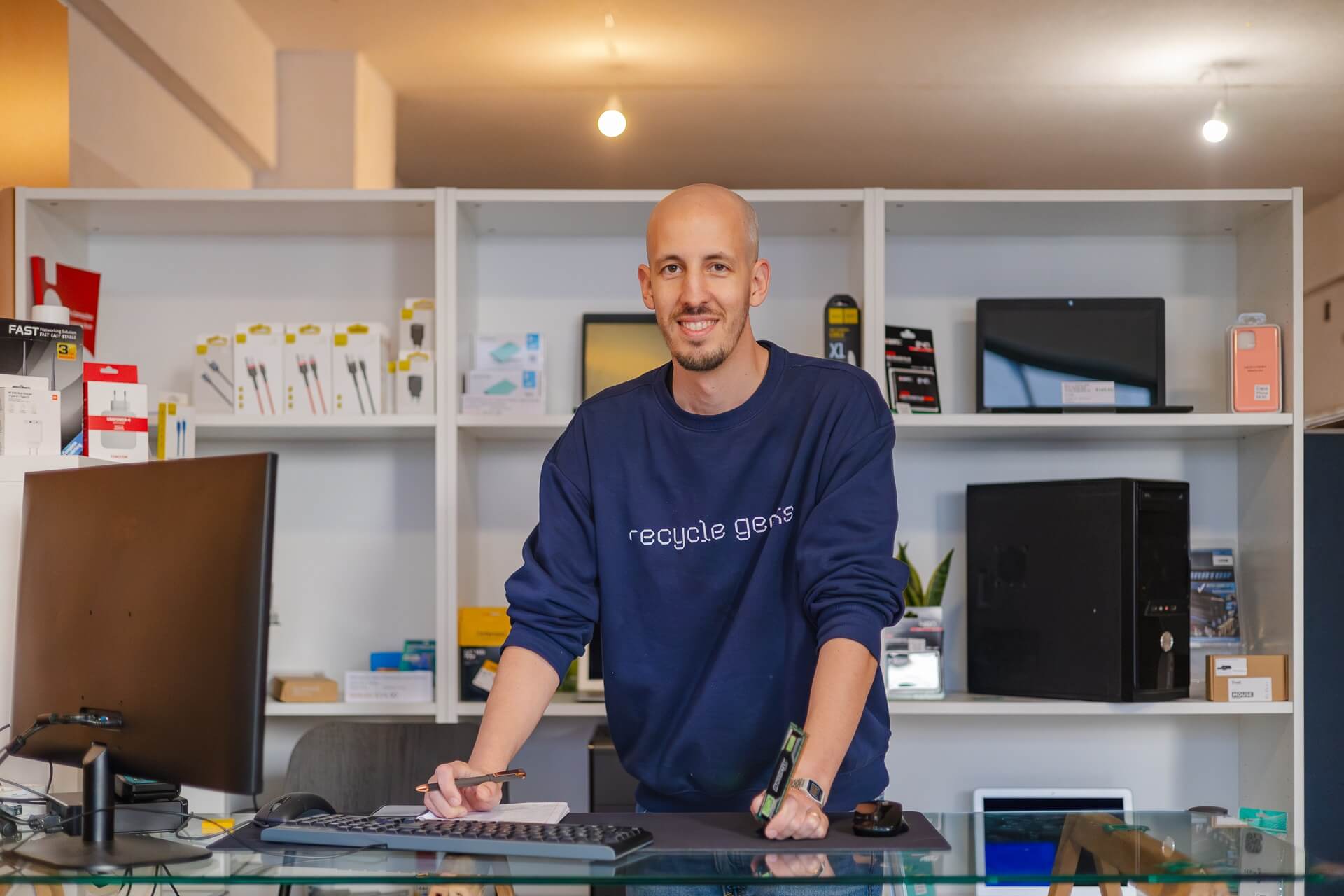João Botelho da Silva: “We wanted to prove that a circular economy company can work and bring value”
João Botelho da Silva: “We wanted to prove that a circular economy company can work and bring value”
Assemble or disassemble, that's the question we asked João Botelho da Silva, CEO of Recycle Geeks, about what he likes to do most when he has an electronic device in his hands. Understanding how things work has fascinated him since he was a little boy when he took apart his first hoover at just five. If João learnt how hoovers were made, you too will want to know what life is like for the entrepreneur from Porto in this month's edition of Out of Office.
What is Recycle Geeks?
Recycle Geeks is a circular economy company working in the field of technology. We collect technology products that people and companies no longer use, recover their value and put them back on the market. The main objective is to extend the life of a technology product and the value it can bring to the market. We know that these products consume a lot of resources, are expensive, are long-lasting, and many products are discarded because they have broken parts. The first big “R” in recycling is the element of reduction, and we try to act on this. We bring back products with some unlocked value, and we are the agents who will unlock that value.
And the idea came about a long time ago?
The idea came about naturally during the pandemic, with several factors contributing. Firstly, during the pandemic, there was a huge demand for computers, and my good friend and co-founder, João Pinto, started receiving a lot of contacts from family and friends to help repair computers. At the same time, we saw this opportunity; there was a lot of scarcity in the market. Even if people wanted to buy a new computer, sometimes it wasn’t available. At the same time, I was working on a fashion project empowering a website that sells new products to have a donation program. They collected items that people no longer wore as donations and resold them to share with charities. By mixing these three elements, we thought: let’s do what I already implemented on this fashion site but for technology. We had the skills, we had already seen that this was something that was happening, and we also had a lot of family and friends who noticed that we liked technology and gave us computers that either had a broken screen or a broken keyboard and, because it was necessary, these people stopped using them because of it. We repaired them and made them available again. We saw that this had a lot of potential, and that’s how Recycle Geeks started, which was also boosted by ClimateLaunchpad in 2021. So we started thinking about doing this. There was a competition opportunity, and we decided to participate with this idea.
And where did your name come from?
I chose it and spent a lot of time thinking about the name; I wanted it to be something that automatically linked us to the area in which we work, hence the Geeks, so it was very much related to technology. Still, it also showed a component of working with products that typically went to recycling. The combination of these Recycle Geeks ended up with the name we currently have. I wanted it to have an international name, giving us a good feeling about it. We don’t get offended at all when someone calls us Geeks, or Recycle Geeks or Recycle Nerds (laughs). We’ve been called many names, and they all bring a smile to our faces. It’s a name that works well.
Is your area of intervention limited to computers?
We started with computers and expanded to cell phones, tablets and video game consoles; for now, we’re sticking to that. We’re not going to expand to household appliances and so on. We’ve seen that there’s already a lot of work done with appliances in RepairCafés with other entities. We think that circular businesses have a hard time communicating and positioning themselves. Being restricted to technology, computers, and cell phones helps us.
And how do these products get to you?
We do free collections from individuals, charities and companies. One of the ways we work with charities is by, for example, having a program with Aldeias Crianças SOS. For example, they collect and appeal for donations of computer products as a group, aggregate these donations, and share them with us. Often, what happens is that if we give a computer to a charity that already has enough computers for its operation, the value we can give to the charity is, of course, in that product, but it’s also in converting that product into money, which can then be allocated directly to activities, whether it’s buying medicines, buying food, buying whatever allows the mission of these organizations to be carried out. We work in partnership with charities along these lines to unlock the value they can obtain more easily in kind.
“We have grown with the funding from our regular operations”
What about private individuals?
We do free collections with companies and individuals. The person delivers a computer and chooses which institution they want to benefit from the delivery, and as soon as we manage to resell that product, the value is automatically given to the institution. In fact, one of the drop-off points for the equipment is here at the reception of UPTEC Asprela I, and the process is straightforward: fill in a short form and drop it off.
And how has this connection between Recycle Geeks and private individuals worked out?
The most significant milestone was undoubtedly the ReBOOT program, which we ran together with Porto City Council. It’s a program co-financed by EEA Grants, where we had the opportunity to train 120 people, who repaired more than 600 computers that will now be given to charities. It was an opportunity to provide more detailed training about what is done, for example, in a RepairCafé, where a person comes with a product and needs help to repair it but has a learning opportunity limited to their problem. In the ReBOOT program sessions, we provide more comprehensive training and show that there can be several different types of problems and what the solutions are. We prepare a manual that helps people to be more autonomous in the repairs they do in the future.
How vital was this association with Porto City Council for your company?
The partnership with Porto City Council for REBOOT was great. It was a perfect way of demonstrating that there are alternatives other than official brand repairs for the computers people have; there are alternatives for people to repair their own computers. These kinds of programs help us broaden our impact and explain the concept of Recycle Geeks. We’ve noticed a significant effect on our activity; opening a store was an outstanding achievement because we’ve been able to open a store with the fruit of our activity so far. Of course, we’re always looking for other partnerships or funding that will allow us to grow faster. Still, we also understand that we’re slightly different from the typical tech startup, which has a lot of funding from Venture Capital. Here, we have to find more creative ways to finance that growth. So far, we have grown with the funding from our regular operation and these kinds of programs in partnership with city councils.
What other ways do you try to boost the impact of Recycle Geeks?
We have a YouTube channel where we share some of the repairs. In these videos, we open our store to the internet and show how we can, for example, wash a keyboard accidentally spilt with liquid or change a computer’s memory. We’ve seen that this is working well, and it’s a way of increasing our impact on the community locally and globally.
How is your team set up at the moment?
At the moment, João Pinto is working full-time, and I am working part-time on this project. The project has been growing and has given us more capacity to support ourselves. We both started part-time, and now he’s full-time. The idea is to keep growing and enable us not only to make a living from this full-time but also to have more impact and extend the project to include more people.
How did your connection with UPTEC come about?
It came about when we won the 2021 edition of ClimateLaunchpad, which honours startups with solutions to reduce environmental impact. We were one of the national winners of the competition. One of the prizes was incubation at UPTEC, which helped us a lot, as it made it possible to materialize programs like ReBOOT, a way of getting in touch with various private and public entities. It also gave us immense visibility in the media. We had the opportunity to speak to the media, such as TSF and other media. Thanks very much to UPTEC and its work to boost its startups. Since then, it’s been about two and a half years, three years, in which we’ve had a good relationship, and we’re happy to be incubated here.
“The fact that we’re still here, three years after we started, is an achievement in itself”
What do you consider to be the main achievements so far?
Winning ClimateLaunchpad was a considerable boost, and it encouraged us to grow. The second thing I’d say was taking part in the ReBOOT program. Still, we’ve also been lucky enough to have programs and partnerships with other entities, for example, eCycle also chose us as a partner to do repair training at the Agronomy School in Coimbra, which has opened a lot of doors for us that I think would have been more difficult to open otherwise. We’ve also been present at different events. Now we’re going to be at Primavera Sound, at the festival that’s going to take place next to Porto City Park this June, where we were last year. Having Recycle Geeks as a company close to people and open to this contact has been a considerable achievement. Circular businesses have a big challenge. They bring a lot of value in general, and they get a lot of environmental value. However, they have some financial and economic challenges associated with them, so the fact that we’re still here, three years after we started, is an achievement.
What about a more complicated moment in your journey?
All companies go through moments when the founders question whether it still makes sense. There have been times when we’ve had more challenges; for example, we tried to open the store, and opening the store was a significant financial investment, which came out of our pockets, and which made us question whether it really made sense to continue in this direction or not. Still, fortunately, we’re not alone; there are two of us, and we have many other people helping us. We’ve had programs such as ReBOOT or eCycle and incubation at UPTEC, which, in the end, forces us to keep going (laughs). All this helps us to persevere. There is no catastrophic moment when things have gone very badly. Still, there are undoubtedly several moments when, either because on a personal level we’re more tired, or we’re ill, or we’ve had some conflict with each other… we’ve had those moments. Still, fortunately, they’ve all been overcome.
You work part-time at Recycle Geeks. How do you reconcile these two jobs?
It’s not easy, so I work more than 40 hours a week. João Pinto and I talk every day, and we’re together every Saturday morning. I’ve agreed with the family that Saturday mornings are for Recycle Geeks, an investment we all make. Fortunately, I can adjust my calendars in my other job to accommodate some Recycle Geeks meetings. Of course, this sometimes creates more of a burden on João Pinto’s side. I also ensure that I check in with him regularly if he’s getting too bogged down; I know this creates a lot of pressure on the full-time person. Sometimes, we use some temporary help to, for example, work on tasks that are easier to pass on to someone else, which also helps.
What about reconciling your personal life?
I have a two-and-a-half-year-old daughter, so it takes work. As I told you, on Saturday mornings, my wife stays with the baby, and I remain at the Recycle Geeks store, so I also have to find moments when she has time to do her programs. Without her help, it would be much more difficult or without the help of my mother and sister, who sometimes stay with the baby. We even have a whiteboard at home on which we line up the dates and what’s to be done (laughs). It creates a lot of effort to align, but at the same time, we make sure we have moments that compensate us for the effort we make together. What brings me happiness has to get her joy, too, so all of this is an achievement and an investment we make as a family.
Between computers, furniture, toys and hoovers, everything has a solution for João. And if he doesn't know what it is, he'll look for it. And if there isn't one, it's life or the end for these materials. With his focus on fuelling the circular economy, the CEO of Recycle Geeks wants to increase the number of gadgets that end up with new owners while continuing to feed his desire to fix things. This desire blends with what he likes to do in his spare time.
What were your early years like?
I grew up in Porto, the son of parents who weren’t from Porto but from the North. They studied in Porto, and I lived my first years in the centre of Porto, where I studied and started working. I studied economics here at the Faculty of Economics at the University of Porto. I worked for about a year in Portugal, and at a certain point, I wanted to see other things. I ended up doing an internship abroad in Vienna, Austria. That internship became a full-time job where I spent five years at the SOS Children’s Villages headquarters. I had the opportunity to do a master’s double degree, where I had the first year in Vienna and the second year in Sydney, where I also studied and worked for a year. After that, I was already together with my wife, and at the time, as Australia was a long way from family and friends, we decided to go back to Europe. We spent some time in Italy and then moved back to Porto because she wanted us to (laughs). At the time, I tried to stay out of Portugal. Still, I’m thrilled to be in Porto at the moment, but at the time, the discussion ended with her deciding that we would move back to Porto (laughs). Since then, we’ve been here. I’ve been in Porto for about 5 years. We had a daughter, and we got married, and that’s been the story so far.
Did your time in other countries help you to develop your entrepreneurial side?
Going to another country helps anyone. Not just because of what you see in other countries but also because we cut ties with what we know and are forced to live outside our comfort zone, which helps me be more comfortable with the unknown. Being an entrepreneur means being comfortable with the unknown. I’ve seen various initiatives and opportunities abroad where it was easier to be an entrepreneur in our home country. Being abroad makes me think on a European scale, not just in Portugal. From the beginning of Recycle Geeks, we sold on eBay and other international sites; we sold to Portugal, Spain, France, and Italy from the start; we didn’t stick to the Portuguese market, which also helped us grow faster.
You mentioned earlier that you studied economics. How did you end up there?
At the time, I went into Economics because I had good grades in Mathematics, I liked things other than Mathematics, and Economics was what seemed most interesting to me at the time. I’m happy I studied economics, I feel it’s a comprehensive course that opens up a lot of doors, and it’s really helped me to make all the business cases, financial planning, general planning of how the company can grow, and all those discussions that I see other entrepreneurs having more discomfort within the area of planning, revenue, estimates, etc. That contributed a lot to my being comfortable with opening Recycle Geeks, and of course when we talk about technical knowledge of computers, that came more from my hobbies. When I was little, I assembled my computer in a shoebox because I couldn’t afford a real computer case. Of course, my parents thought it was a fire hazard in the house, but it wasn’t (laughs). The technical component of computers was picked up through self-learning experience. The element of structure logic, of thinking in terms of projects, of the contributions that each element can bring to revenue or costs, was at the Faculty of Economics. That ended up making me more complete. It was a profile that, potentially, would have needed more work to learn independently. I know that many other entrepreneurs learn it as they go along.
Looking back, what's your first memory of something you took apart?
I remember my parents having a portable vacuum cleaner, one of those car vacuum cleaners I found fascinating. I decided to open it… in the process, there was a rubber that broke, which I couldn’t repair, and my mother wasn’t happy about it (laughs). I was five years old at the time. It was interesting to see that my mother was distraught, not so much because I opened it. Still, more because I couldn’t put it back together correctly, and that was one of those formative memories that remain. I didn’t feel it was a problem to open things, but rather if I couldn’t repair them (laughs). So that gave me carte blanche to continue opening things, computers, and toys. I’d even put them in the freezer (laughs).
In the freezer?
Yes, I used to do various experiments at home, ranging from physics to chemistry and engineering, so I liked to open things up to see different ways of repairing them, as you said. Still, I would also try to freeze a toy and see how I could then get a miniature replica of the toy on ice. Basically, a mould of the toy in ice, I can’t quite remember why I did it, but it was something I did (laughs). I’d often do the experiment first, and only then would I try to figure out what I could do with it.
Basically, you wanted to understand how things worked...
Yes, I was obsessed with understanding how things worked. One of the videos with the most views on the Recycle Geeks YouTube channel is about how a postcard that came with the Revolut card worked. It opened simultaneously, and I had to take the whole thing apart to understand how it worked (laughs). It’s something that fascinates me, thinking about how they did it, how the device works, whether it’s appliances, computers, furniture, and we try to apply these learnings in the company, whether it’s repairing someone’s computer, or how we’re going to set up the store, how we’re going to find a way to prepare the pipeline of computers that arrive, what’s the most efficient way to organize our work, etc.
Furniture? Did you enjoy doing this when you were younger, or do you still do it?
I am fascinated by seeing how different things will be built. Because of that, when I was studying for my master’s degree, and I didn’t have a job, I went to assemble furniture. I wanted to earn money, and between working in a restaurant or assembling furniture, assembling furniture was a much more fascinating job from my perspective, and I loved it. Even today, when I buy things at IKEA, I love making them. Of course, I enjoy assembling more than others, but it’s more the component of finding the shape and structure of things that fascinate me.
What's more satisfying: taking things apart or putting them together?
Assembling is typically more satisfying because disassembling requires a lot of concentration and mental work (laughs). I like to be very organized, so if I’m dismantling a computer, I’ll have a sheet of paper next to me where I’m going to put the screws; the same goes for furniture, and when I’m assembling, it’s much more enjoyable (laughs). If I open a vacuum cleaner, I’d like to know precisely how the vacuum is generated. Is it a fan? Is it a piston? Is it powered by a battery? How does the battery work? Does the plug connect directly to the wires or to a chip? That’s the thing that interests me, and I think in detail about how it works.
How do you fit all the pieces of your life together and put your day-to-day life together?
It isn’t easy. My days are long and short at the same time. I only have a little free time to find things different from the ordinary. Usually, to relax, if I’m really stressed, I try to do something totally different, such as do the laundry, cook, organize the pantry, or anything else. And, of course, I regularly relax by watching a series with my wife or playing games with my friends.
Can you leave out that desire to understand how everything works?
Outside of work, I’m that person who, if a friend invites me to change the way the fridge door opens, will be there (laughs). If they have a problem with their car and need to find a different way of solving it, I’ll certainly be happy to find the most exciting way to solve it (laughs).
“When people are looking for a product at a great quality price, they can talk to us”
And when you can't find a solution?
I search the internet, go to forums, or, ultimately, accept that I’m not going to understand (laughs).
How do you envision your next five years? Yours and Recycle Geeks'?
I’d love to see Recycle Geeks grow and have much more impact, especially regarding our work with donated products. One thing that would make me happy is to be able to say that Recycle Geeks is working with a ton of products a month that have been reinserted into the market; that would be something that would help us, and I feel it would be a direct contribution that we would bring to our society. It’s in line with your question about whether the social component is always considered or not… one of the main objectives was to prove that a circular economy company focused on reducing waste can work and bring value. If five years ago, when we started, we had a lot of people saying, “That’s not going to make money”, “that doesn’t make sense”, “you’re going to discard a lot of things”, “they’re going to work to heat up with a lot of products”, I’d like to feel that we have even more people believing that we’re a reference in this process, that when people have a product they no longer use, they can give it to Recycle Geeks, and that when people are looking for a product that’s at a great quality price, they can talk to us.
And do you think the world is moving towards strengthening the circular economy?
Yes. The world is increasingly impatient with the lack of climate action, and it’s an ideal time for companies like Recycle Geeks, which are trying to fight greenwashing, to assert themselves. I see a lot of companies selling new technology, and all of them are already implementing take-back programs with a lot of impact. I see that everyone knows they can hand in their old phone when they buy a new one; this change is already taking place in the minds of customers and consumers. But we can go even further, so that’s where we’re heading.
What is your greatest virtue and your most significant flaw?
Starting with my fault, I’m highly confident in the time I will spend doing things, and I’m often late or take longer than I thought I would (laughs). I know that I usually find it difficult to estimate the time I need to do things, whether it’s the time I need to leave the house, get to a dinner with friends on time, or the time I need to answer an e-mail or repair a computer (laughs). In terms of qualities, I can keep calm and be very diplomatic in any situation, even in the most hostile situations; I manage to deal with them without escalating the problem further.
Do you have any dates in your memory?
There is a fascinating coincidence when it comes to dates… On February 6, 2022, my daughter was born, and the very next day, I had the first meeting of the ReBOOT project to start discussing the partnership and the possibility of doing the biggest training project that Recycle Geeks had ever done. I had this meeting while I was waiting to be able to join the maternity visits. We were in the pandemic phase and only had a few hours to visit the children. It was an exciting day full of joy, personally and professionally.
So February 6th and 7th? (laughs)
The 24 hours that started when Sofia was born (laughs).
Finally, tell us something you'd like to do in the future.
I’d like to see Recycle Geeks open stores and offices in another country; that would be a phenomenal achievement. And I’d like to fly an aeroplane (laughs). It’s not something I’m trying very hard to achieve, but I’d really like to fly a plane; it could be a small one (laughs).
May 29, 2024
